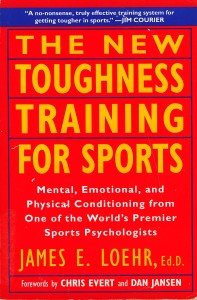“You cannot run away from a weakness; you must sometimes fight it out or perish; and if that be so, why not now, and where you stand.”- Robert Louis Stevenson
Many people love the game of tennis, as it is a game that reflects some of the physical and mental challenges we face in our daily lives. One common phenomenon relates to handling high pressure situations, which is really a key distinction of successful people.
For example, often an unnecessary or even painful loss can trigger a whole cascade of defeats, robbing a tennis player from all his confidence. This can leave an athlete very confused and frustrated. Ironically, it is in these moments that clarity and mental toughness are so vital to turn around his fate.
What distinguishes the very best, from everyone else, is that they rebound faster from such defeats, while extending their waves of successes. This ability comes from their deep rooted belief in themselves and their ability to handle any kind of competitive circumstances. Top performers love the battle, and feel energized and driven when engaged in challenges.
In contract, competitors who don’t enjoy this kind of mental strength revert to feelings of anger and negativity when facing difficult situations. They either are not able to dig deep enough and push themselves out of their comfort zone, or they experience excessive feelings of fear and anxiety when facing the prospect of losing. In either case they suffer as they feel unequipped to handle real pressure.
So how do we explain why some people enjoy more mental toughness than others?
In his great book, The New Toughness Training for Sports, James Loehr argues that growing up facing either too much and
 too little stress will undermine an athlete’s toughness. For example, kids who never learned to push themselves will struggle to dig deep on a regular basis, while those who were pushed too hard may experience extreme feelings of fear and anxiety in competitive situations.
too little stress will undermine an athlete’s toughness. For example, kids who never learned to push themselves will struggle to dig deep on a regular basis, while those who were pushed too hard may experience extreme feelings of fear and anxiety in competitive situations.
Loehr reveals the real secret to mental toughness: It is the ability to balance recovery and stress in at least three dimensions:
- Physical
- Mental
- Emotional
We all know that physical stress happens when we expend energy in moving muscles, and that failing to give them time to rest, can result in injuries and exhaustion.
However, what may be more surprising is the importance to both push ourselves, and then allow ourselves to recover our mental and emotional “muscles”.
For example, combining regular practices of visualisation, focus and positive thinking exercises with moments in which we allow our mind to wander is the secret to enhancing our mental skills.
Equally significant is the need to expose ourselves to high pressure situations that make us witness feelings of fear, anger and frustration, while balancing them with moments of joy and fun such as hanging out with friends and family.
The need to balance stress and recovery is as vital to athletes as it is to all of us. Success comes from being able to respond to crises and setbacks, and allowing them to make you stronger and tougher.
I want to encourage you to create your personal training ritual that will allow you to become stronger mentally and emotionally. Think of ways how you can train to become more focused, and to experience the emotions that serve you. Now add things you can to fully recover mentally and emotionally, so that you feel rested and recovered. By doing so, you will not only become better at what you do, but also enjoy the process. ☺